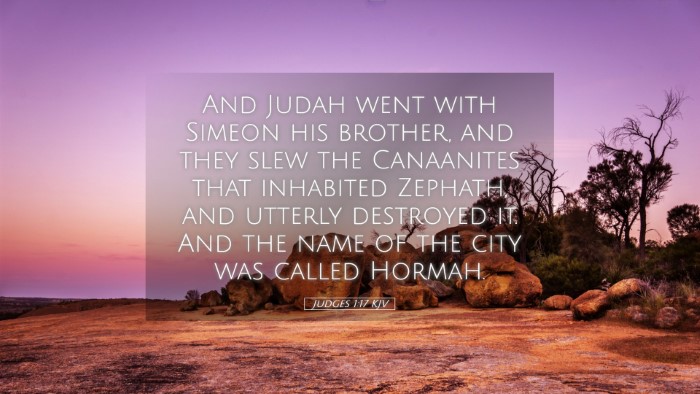Commentary on Judges 1:17
Judges 1:17 states: "And Judah went with Simeon his brother, and they slew the Canaanites that inhabited Zephath, and utterly destroyed it. And the name of the city was called Hormah."
Introduction
The Book of Judges serves as a narrative that details the cycles of Israel's disobedience, judgment, repentance, and deliverance. The verse in question reflects not only a historical account but also a theological significance inherent in Israel's conquest of the Promised Land. This commentary aims to offer insights from esteemed biblical scholars Matthew Henry, Albert Barnes, and Adam Clarke.
Textual Analysis
In Judges 1:17, we observe the collaboration between the tribes of Judah and Simeon in their military endeavor against the Canaanites. The act of destroying the city of Zephath, subsequently renamed Hormah, symbolizes a significant victory in the ongoing struggle to secure the land promised to Israel.
Interpretations by Matthew Henry
Matthew Henry emphasizes the unity of the tribes. He notes that although Judah was the leading tribe in the conquest, they did not act independently but enlisted the assistance of their brother Simeon. This collaboration illustrates the importance of unity in purpose and action among God's people. Henry points out that this moment of joint effort reflects the profound truth that unity among believers can lead to remarkable victories in the face of opposition.
Insights from Albert Barnes
Albert Barnes focuses on the implications of the victory achieved at Zephath. He comments on the significance of naming the city Hormah, which means "destruction" or "devotion to destruction". This renaming serves a symbolic purpose: it is a reminder of God's judgment upon the Canaanites and His faithfulness to fulfill His promises. Barnes elucidates that by destroying the city, Judah and Simeon's actions align with God's mandate to cleanse the land of its corrupt inhabitants, thus paving the way for the establishment of a new order based on divine principles.
Reflections from Adam Clarke
Adam Clarke provides a historical context to the conquest of Zephath. He elucidates that the Canaanites represented the persistent evil and idolatry that had to be eradicated for Israel to thrive as a nation under God's Law. Clarke posits that the narrative serves as a lesson regarding the necessity of combating sin and idolatry within one’s own life and community. He further emphasizes that the effectiveness of the Judah-Simeon alliance illustrates that victories often require cooperative efforts in the pursuit of holiness and God's will.
Theological Reflections
- Unity in Purpose: The collaboration between Judah and Simeon showcases the importance of working together in the mission of the Gospel. The lesson for contemporary believers is to seek partnership in ministry, recognizing that individual efforts are often less effective than collective action.
- The Significance of Naming: The act of renaming the city to Hormah highlights the importance of identity in biblical narratives. Just as God redefines names and purposes throughout Scripture, believers today are called to embrace their new identity in Christ, which often involves casting aside remnants of past lives.
- Judgment and Holiness: The destruction of the Canaanites signifies God's judgment on sin. This reality serves as a sobering reminder of the consequences of disobedience and the call for believers to maintain holiness, both in personal and communal lives.
Applications for Pastors, Theologians, and Students
In preaching and teaching from Judges 1:17, it is crucial to contextualize the text within the broader narrative of Scripture. Pastors can use this verse to illustrate the necessity of pursuing righteousness and striving against sin, embodying the unity of the body of Christ in their ministries. The historical and theological insights offered by Henry, Barnes, and Clarke should inform sermon preparation and Bible study discussions, prompting deeper examination into the implications of biblical narratives on believer's lives.
Conclusion
Judges 1:17 provides more than just a historical recounting of a battle; it encapsulates themes of unity, divine judgment, and the importance of aligning one’s life and community with God's purposes. The reflections of Matthew Henry, Albert Barnes, and Adam Clarke guide readers in understanding not only the text itself but also its implications for the Christian faith today. As believers engage with this passage, they are called to reflect on their collective mission and the urgency of pursuing holiness in a world often aligned with sin.


